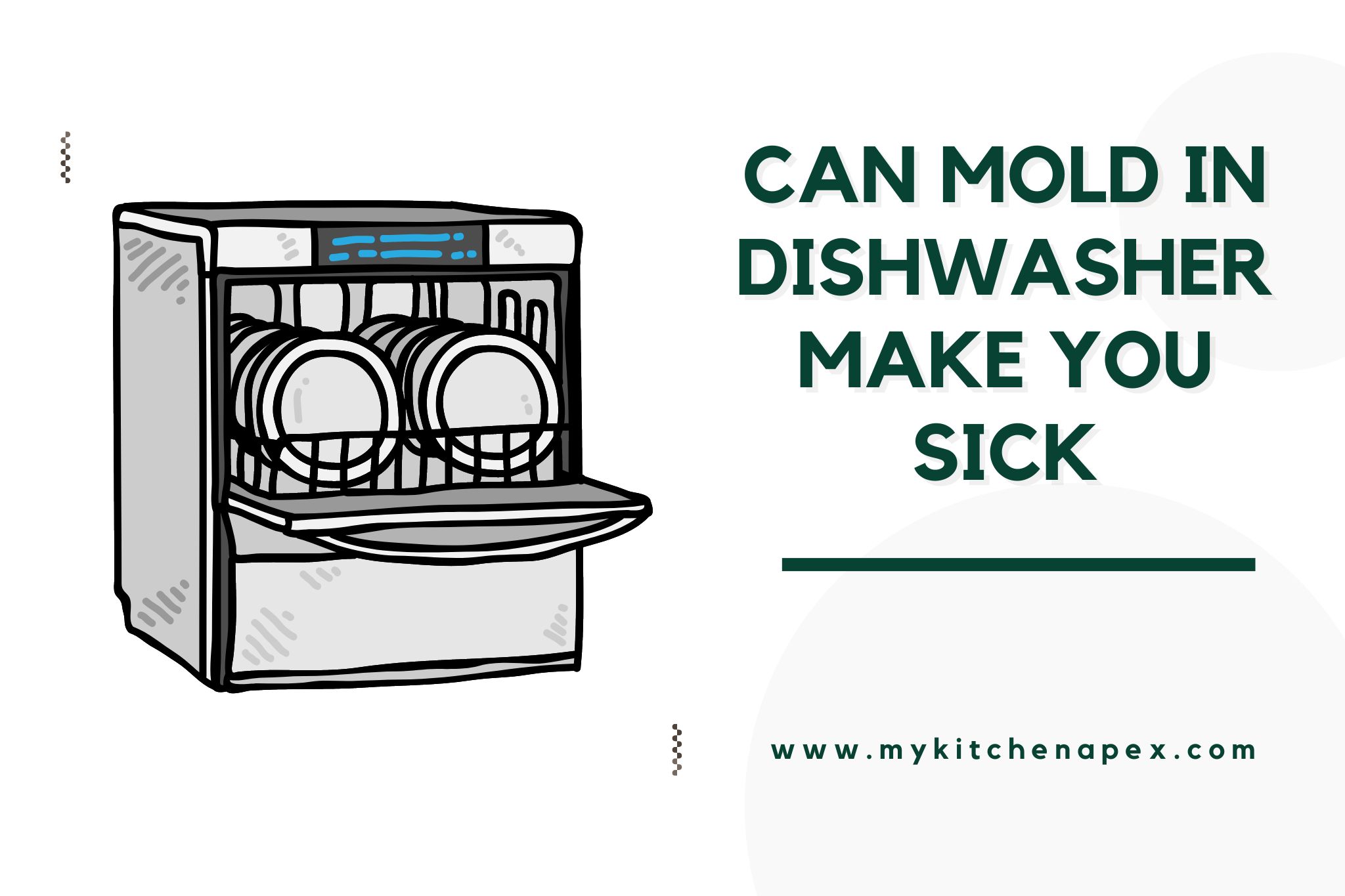Originally Created on: January 18, 2024 @ 6:00 pm
Are you concerned about the potential health risks of mold in your dishwasher? Wondering if those mysterious black spots could be making you sick? You’re not alone. Mold growth in dishwashers is a common problem that many homeowners face, but the impact it can have on your health is often misunderstood. In this blog post, we’ll explore the connection between mold and illness, uncovering the truth behind this household dilemma.
When it comes to our well-being, even the smallest details matter. From our diets to our cleaning routines, we strive to create a safe and healthy environment for ourselves and our loved ones. But what happens when something as seemingly innocuous as a dishwasher becomes a breeding ground for potentially harmful mold? Join us as we dive into the world of dishwasher mold and discover how it can affect your health – both physically and mentally.
Table of Content
Highlights:
- Mold in your dishwasher can lead to respiratory issues and allergic reactions.
- Regular cleaning and maintenance are crucial to prevent mold growth in your dishwasher.
- Proper ventilation and using natural cleaning agents can help minimize health risks associated with dishwasher mold.
can mold in dishwasher make you sick
Mold in your dishwasher can potentially make you sick. Mold thrives in damp and dark environments, making dishwashers a perfect breeding ground. When you run your dishwasher, the heat and moisture create an ideal environment for mold to grow on leftover food particles or other organic matter that may be present. If you inhale or come into contact with mold spores while unloading clean dishes, it can lead to respiratory issues such as coughing, sneezing, and even allergic reactions. To prevent mold growth in your dishwasher, it’s important to regularly clean and maintain it by removing any food debris, wiping down seals and gaskets, and running empty cycles with vinegar or bleach to kill any existing mold spores.
If you suspect there is mold in your dishwasher or experience symptoms after using it, it’s crucial to address the issue promptly. Ignoring the problem can result in further health complications. Regular cleaning and maintenance will not only keep your dishes sparkling clean but also help prevent potential health risks associated with mold growth in your dishwasher.
To ensure a safe environment for yourself and your family when using the dishwasher, consider implementing preventive measures such as proper ventilation of the kitchen area where the appliance is located or using natural cleaning agents like baking soda instead of harsh chemicals that may contribute to indoor air pollution. By taking these steps, you can minimize the risk of exposure to harmful molds while enjoying the convenience of a well-functioning dishwasher.
You May Also Like: can you put a crock pot in the dishwasher
Health risks of dishwasher mold
Are you aware of the health risks associated with dishwasher mold? Mold growth in dishwashers can pose serious health hazards to you and your family. When left unchecked, mold can release spores into the air, leading to respiratory issues such as coughing, wheezing, and allergies. Additionally, exposure to mold can cause skin irritation and eye discomfort. To prevent these health risks, it’s crucial to regularly clean and maintain your dishwasher by removing any visible mold and ensuring proper ventilation. By taking these precautions, you can keep your dishwasher free from harmful mold and protect the well-being of your loved ones.
If you’re concerned about the health risks of dishwasher mold, it’s important to take action immediately. Mold growth in dishwashers is not only unsightly but also potentially dangerous for you and your family’s well-being. The presence of mold can lead to various health problems such as respiratory issues, skin irritations, and eye discomfort due to exposure to its spores. To minimize these risks, make sure to clean your dishwasher regularly using appropriate cleaning agents or natural remedies like vinegar or baking soda. Additionally, ensure that there is proper ventilation around the appliance by leaving the door open after each use or installing a vent fan nearby. By staying proactive in preventing dishwasher mold growth through regular maintenance practices, you can safeguard yourself against potential health concerns.
Don’t underestimate the potential health risks associated with dishwasher mold! Mold growth inside this household appliance may seem harmless at first glance but could have severe consequences for your well-being if left unaddressed. Breathing in airborne spores released by molds found in dishwashers can trigger respiratory problems like coughing or wheezing while also causing allergies or other allergic reactions in susceptible individuals. Moreover, direct contact with molds may result in skin irritation or discomfort in the eyes. Protect yourself from these hazards by maintaining a clean environment within your dishwasher through regular cleaning routines using suitable cleaning products that effectively eliminate mold. Additionally, ensure proper ventilation by allowing the dishwasher to air out after each use or installing a vent fan nearby. By taking these preventive measures, you can minimize the health risks associated with dishwasher mold and enjoy peace of mind knowing that your family’s well-being is protected.
How to prevent mold in dishwasher
Are you tired of dealing with mold in your dishwasher? We’ve got you covered. Mold can be a common problem in dishwashers, but there are steps you can take to prevent it from growing and spreading. First, make sure to clean your dishwasher regularly by removing any food debris or residue that may have accumulated. This will help eliminate the conditions that mold thrives in. Additionally, consider using a dishwasher cleaner or vinegar solution on a monthly basis to keep your dishwasher fresh and mold-free. By following these simple tips, you can say goodbye to mold and enjoy a clean and hygienic dishwasher experience.
Exclusive Dishwasher Picks
🔥 Our Top Dishwasher Picks! 🔥
Preventing mold in your dishwasher is essential for maintaining cleanliness and hygiene in your kitchen. To start, always scrape off excess food from dishes before loading them into the dishwasher – this will prevent any food particles from becoming trapped and creating an environment for mold growth. Next, ensure that your dishwasher is properly ventilated by leaving the door open after each cycle to allow air circulation. Lastly, run regular cleaning cycles with hot water and bleach or vinegar to kill any existing bacteria or fungi. By implementing these preventive measures, you can keep your dishwasher free from mold and enjoy spotless dishes every time.
Don’t let mold ruin your dishwashing experience! Follow these easy steps to prevent its growth in your dishwasher: Firstly, check the drain filter regularly and remove any debris that may have accumulated – this will help maintain proper drainage and reduce moisture levels inside the appliance. Secondly, leave the door slightly open when not in use to allow air circulation and discourage mold growth. Finally, run empty cycles with baking soda or citric acid once a month to eliminate any lingering odors or potential sources of contamination. With these preventive measures in place, you can keep your dishwasher clean and free from pesky molds!
Also Read: does dishwasher come with power cord
Is it safe to use a dishwasher with mold?
Using a dishwasher with mold can pose health risks and affect the cleanliness of your dishes. Mold thrives in moist environments, and dishwashers provide the perfect conditions for its growth. When you use a dishwasher with mold, it can contaminate your dishes, utensils, and even the water used in subsequent wash cycles. This can lead to potential foodborne illnesses and respiratory issues.
To ensure safety and hygiene, it is important to address mold in your dishwasher promptly. Start by cleaning any visible mold using a mixture of bleach and water or a commercial mold remover. Additionally, run an empty cycle with hot water and vinegar to help eliminate any remaining mold spores.
Prevention is key when it comes to avoiding mold growth in your dishwasher. Regularly clean the interior of your dishwasher, paying special attention to areas prone to moisture buildup such as seals, gaskets, filters, and spray arms. Allow the dishwasher to fully dry after each use by leaving the door slightly open.
In conclusion, using a dishwasher with mold is not safe as it can compromise both your health and the cleanliness of your dishes. Take immediate action to remove any existing mold and implement preventive measures to avoid future growth.
Best practices for maintaining a clean and healthy dishwasher
Are you tired of your dishwasher not cleaning as well as it used to? Follow these best practices for maintaining a clean and healthy dishwasher. First, regularly remove food debris from the filter and spray arms to prevent clogs and ensure proper water flow. Second, run a monthly cycle with a dishwasher cleaner to eliminate buildup and odors. Finally, wipe down the door gasket and interior walls with a damp cloth to prevent mold growth. By following these simple steps, you can keep your dishwasher running smoothly and enjoy sparkling clean dishes every time.
In addition to regular maintenance, there are some everyday habits you can adopt to keep your dishwasher in top shape. Start by scraping off excess food before loading the dishes to prevent particles from getting trapped in the machine. Use high-quality detergent that is specifically designed for dishwashers, as this will help maintain optimal performance. Lastly, avoid overloading the dishwasher as this can lead to poor cleaning results. By implementing these best practices into your routine, you’ll extend the lifespan of your appliance and ensure it continues to deliver spotless dishes day after day.
Ready for a squeaky-clean dishwasher? Take action now by incorporating these best practices into your routine! With just a few simple steps, you can maintain a clean and healthy dishwasher that consistently delivers outstanding results. Say goodbye to dirty dishes and hello to hassle-free cleaning!
Also Read: do you need to crack the oven door when broiling
Final Thoughts
Mold growth in dishwashers can pose serious health risks, including respiratory issues and allergies. To prevent mold, regularly clean your dishwasher by removing food debris and using natural cleaning agents like vinegar or baking soda. Proper ventilation is also important. If you suspect mold, address the issue promptly to avoid further complications. By taking these preventive measures, you can protect yourself and your family from potential health hazards associated with dishwasher mold.

